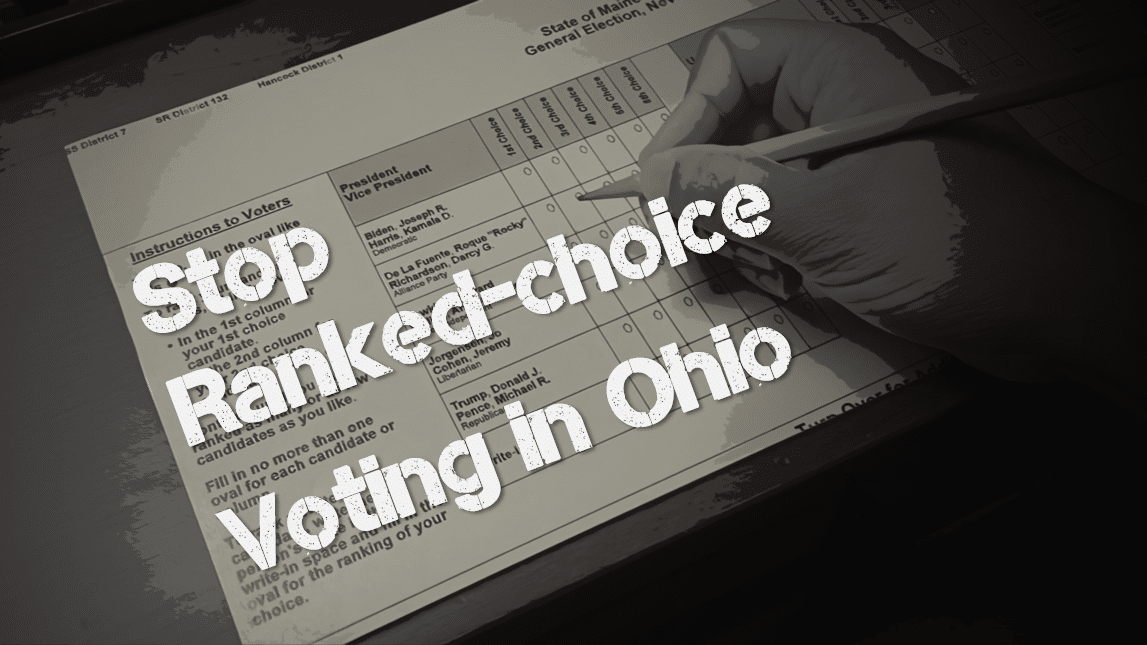Alert Summary
SB 137 has been introduced in the Ohio General Assembly to prohibit ranked-choice voting (RCV) in the state. It is imperative that legislators enact this bill and ensure full election integrity.
Take Action NowContact your Representative
Please help pass SB 137 and fully prohibit ranked-choice voting by contacting your state legislators. Urge them to stand up for election integrity and stop every scheme that undermines it.
Clicking this button will take you to a page where you can send a pre-written letter, call your officials, and/or send video messages.

Legislation has been introduced in the Ohio General Assembly to prohibit ranked-choice voting (RCV) in the state. It is imperative that legislators enact this bill and ensure full election integrity.
Senate Bill No. 137 (SB 137) is sponsored by Senator Theresa Gavarone (R-Bowling Green). If enacted, it would ban ranked-choice voting (RCV) or instant-runoff voting in the state. Furthermore, SB 137 would prevent any local-government entity from receiving state funds if it has enacted RCV.
RCV threatens election integrity and undermines the electorate’s ability to choose the best candidate in elections. The May 10, 2021 issue of The New American magazine explains how ranked-choice voting works and why it would harm U.S. elections:
[It] is a complicated system that requires voters to assign a rank to each candidate on the ballot, regardless of whether they support that candidate. If no candidate is ranked first by a majority of voters, the lowest-performing candidate is eliminated. Voters who gave their highest ranking to the eliminated candidate then have their second choice counted instead. This process repeats until one candidate receives a majority.
As implied above, ranked-choice voting can lead to candidates with little genuine support winning elections. The system confuses voters, distracts from policy issues, and forces voters to vote for candidates they otherwise would not support. In the United States, ranked-choice voting was enacted in Maine in 2016 and Alaska in 2020. These efforts, primarily backed by liberals, led to Republican U.S. Representative from Maine Bruce Poliquin losing to Democrat Jared Golden in 2018 despite winning a plurality in the first round. Meanwhile, some political analysts believe that Alaska’s new system, which also eliminates party primaries, will enable liberal Republican Senator Lisa Murkowski’s reelection in 2022 despite her unpopularity among Republicans.
With any voting system, the more complicated it is, the greater the risk of manipulation strategies or fraud. Additionally, RCV would make hand counts much more difficult, creating an excuse for computerized vote counting. By contrast, genuine election integrity must involve hand-counted paper ballots.
Contact your state representative and senator and urge them to support SB 137 to end RCV for municipalities, and to further strengthen election integrity in Ohio.
Although we provide a way to easily email legislators, we know from long experience that it takes a lot more interaction with your legislators to get your point across than that provided by emails alone.
That's why we provide an easy way not only to email them, but to contact them by phone, tweet, and even video message them.
